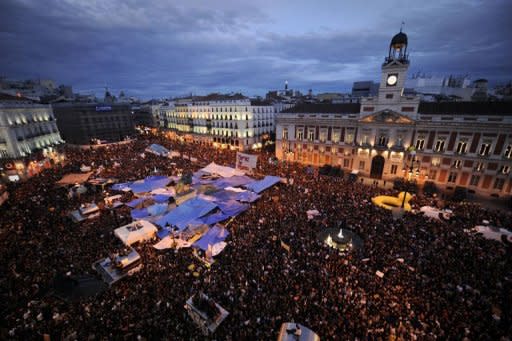Spain's 'indignants' to retake the streets
A year after taking over Spain's streets and squares, sparking a global uprising against economic injustice, the "indignants" are plotting a comeback. The activists, who once led hundreds of thousands into the streets, are launching a four-day protest May 12-15, ending on the anniversary of the movement's birth in Madrid's Puerta del Sol. Saturday is billed as a day of global protest across Europe and the Americas, from Madrid, Paris, Athens and London to Rio de Janeiro and New York, home of Occupy Wall Street. This time, Spaniards have more to protest: a recession, unemployment at 24.4 percent, and 52 percent for the young, and more than 30 billion euros ($39 billion) in austerity measures so far this year. But Spain's "indignants" are deeply divided over their internal organisation, and struggling for a role as unions take centre stage mobilising huge, near weekly protests. They also face Madrid authorities determined to stop a repeat of last year's month-long sprawling encampment in Puerta del Sol: a fond memory for the movement's supporters, but an ugly blight for its opponents. The government has issued a permit for the "indignants" to use the Puerta del Sol for a five-hour protest Saturday and 10 hours on each of the following three days. But "we are not going to allow encampments, which are illegal," Cristina Cifuentes, an interior ministry official for Madrid, told reporters Wednesday, refusing to comment on reports that 1,000 police would be deployed. Organisers say they will protest in 80 towns and cities. In Spain's second city Barcelona, the city hall seems prepared to tolerate an encampment for a limited period. But Madrid's Puerta del Sol is more important; it is the emblematic cradle of the movement. Activists say four marches will converge on the square Saturday but have not announced plans for an encampment. The birth of the "indignant" movement in a country where popular protest had seemed muted is still a matter of pride to protesters. "It was a big surprise, it was the biggest thing that had happened in Spanish politics in years," said 24-year-old activist Rita Maestre of Juventud Sin Futuro (Youth Without Future). "There we put up our tents, and there was the library," said the tall, dark-haired protester, pinpointing memories in a square now occupied by tourists. "That was the month I learned the most. It made me realize that there can be a future, that there are alternatives," Maestre added. Activists say the movement is more active online now than on the streets, but they are ready for a reappearance. "The situation has not improved: on May 12 we will see that the movement is still very strong," Maestre predicted. Jon Aguirre, a 27-year-old architect who became an unofficial "indignant" spokesman, was pessimistic about the outlook in Spain, where many young unemployed rely on their families to survive. "When families can no longer help, we will see what happens: what happened in Greece is not far off," he said. Conscious of a loss of influence as unions take a bigger role and frustrated by the sluggish, consensus-based decision-making, part of the core Democracia Real Ya (Real Democracy Now) movement decided last month to register the group as an association. But the backlash was fierce, and many branded them traitors on online social forums. "A totally horizontal organization did not work," said Fabio Gandara, one of the founders of Democracia Real Ya. "An association is more practical," he told the daily El Mundo. Antonio Alamino, sociology professor at Alicante University, said the "indignants" had failed to organize and were left expressing a discontent born from social and economic malaise without a concrete ideology. "The result: lots of small relatively disconnected groups that no longer form a social movement," he said.



